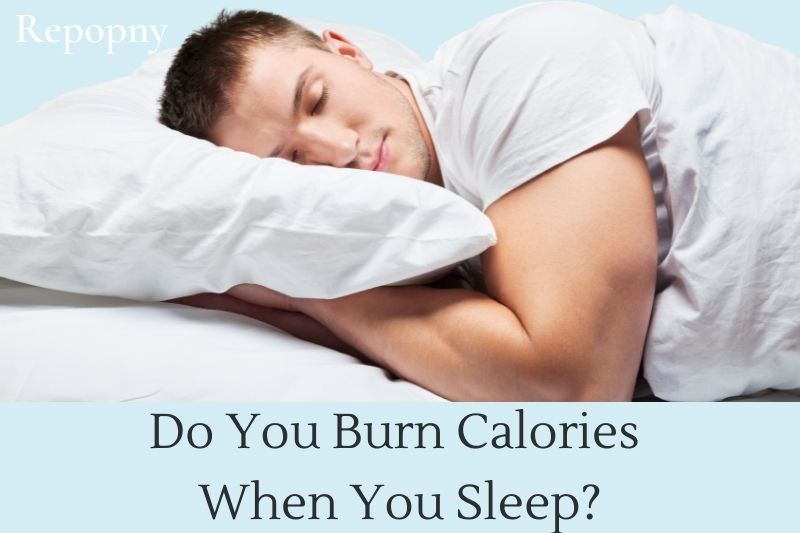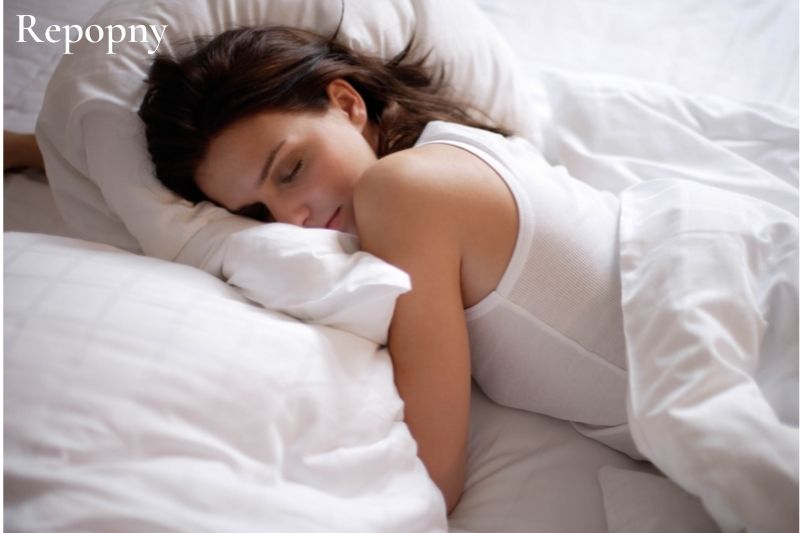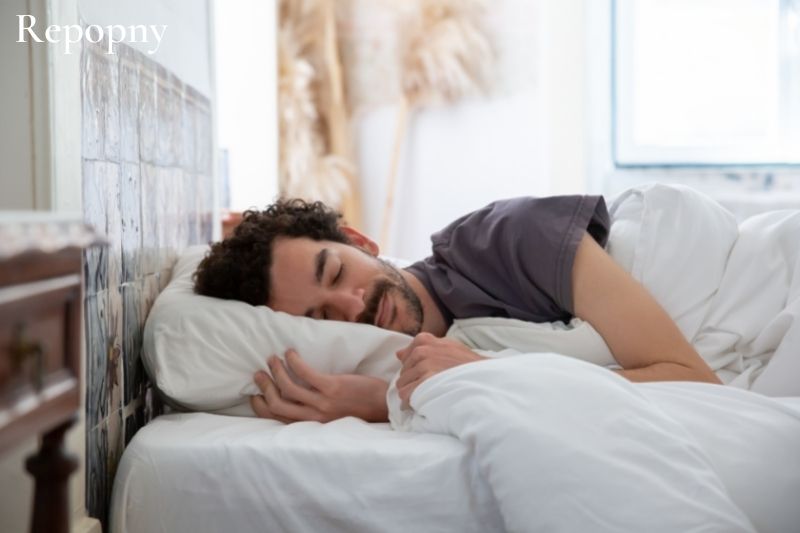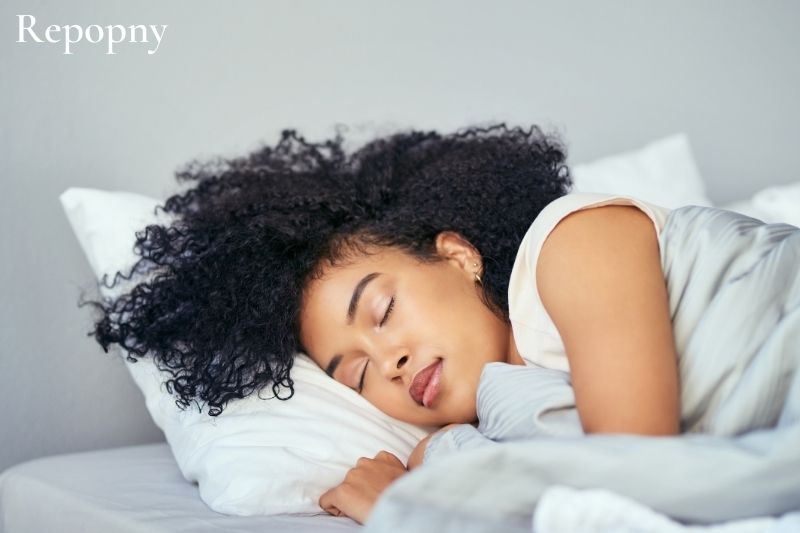It’s a common question: do you burn calories when you sleep? The answer may surprise you. According to research, you naturally burn a small number of calories while you fall asleep. However, the number of calories burned during sleep is significantly lower than the number burned during other activities, such as exercise.
Let’s explore deeply in this article!
Contents
How Many Calories Are Burned While Sleeping?
As a rough estimate, we burn roughly 50 calories each hour while sleeping. However, based on their specific basal metabolic rate, the average person burns various calories during sleeping (BMR).
The energy required for fundamental tasks like breathing, circulation, temperature regulation, and cellular growth and repair is the basal metabolic rate. The basal metabolic rate accounts for around 80% of total calories burnt in a day. The brain burns glucose for energy, accounting for about 20% of the calories we eat at rest.
The body uses sleep to heal and restore itself. Our body temperature drops, breathing slows, and metabolism slows to do this more effectively. Compared to their basal metabolic rate during the day, most people burn roughly 15% fewer calories during sleeping.
What Influences the Basal Metabolic Rate?
The basal metabolic rate differs from person to person and is influenced by a variety of factors affect, only some of which can be altered:
- Height and Body Weight: A person’s body takes the more calories to function the larger it is.
- Fitness: Because muscle mass burns more calories than fat, people who are fit and active burn more calories even when resting.
- Males have a greater BMR than females.
- Age: Growing children have a faster metabolism, but as we get older, our metabolic needs diminish.
- Diet: Maintaining a nutritious diet can aid in managing body fat composition.
- Sleep Quality: Inadequate sleep and poor sleep quality harm metabolism.
- Race: According to some studies, African-Americans have a naturally lower BMR.
- Genetics. To some extent, genetics can influence metabolism.
- Pregnancy, lactation, menopause, hypothyroidism or hyperthyroidism, and other factors can cause the resting metabolic rate. If you think an underlying issue influences your metabolism, talk to your doctor.
How to Work Out How Many Calories You Burned While Sleeping
A calorimeter is required to calculate your accurate basal metabolic rate. A calorimeter analyzes the oxygen and carbon dioxide breathed and exhaled by your body to determine how much energy you consume.
People who desire the most accurate reading of their basal metabolic rate usually spend the night in a laboratory, refraining from exercise for 24 hours, fasting for 12 hours, and sleeping for at least 8 recommended hours before the reading.
These facts are crucial since digestion and physical activity are energy-intensive processes that induce metabolic spikes. The measurements are taken in a darkened, temperature-controlled environment in the morning.
Because of the cost and complexity of this test, it is not feasible for the typical person to take it. You can derive a ballpark estimate of your basal metabolic rate using one of many equations. The Harris-Benedict equation8, based on body weight, height, age, and gender, is one of the most popular.
- Male: BMR = 66.5 + (13.8 x weight in kg) + (5 x height in cm) – (6.8 x age in years)
- Female: BMR = 655 + (9.6 x weight in kg) + (1.8 x height in cm) – (4.7 x age in years)
Over 24 hours, the result provides you with your basal metabolic rate while awake. Divide the number by 24 to get the hourly rate, then multiply by 0.85 to account for the reduced metabolic rate while sleeping.
The Harris-Benedict equation does not consider heredity, race, hormones, muscle-to-fat ratio, or medical issues, even though it distinguishes between men and women. Calculate your Harris-Benedict equation9 (BMI) to get an approximate estimate of your muscle-to-fat ratio:
- BMI = weight (lbs) / [height (in)]2 x 703
A BMI of less than 18.5 indicates being underweight, whereas a BMI of more than 25 indicates being overweight. BMI over 22.9, on the other hand, is considered heavy for Asian or Asian American ancestry. Obese people have a higher proportion of fat in their bodies, which burns fewer calories than muscle burns. Please remember that this BMI formula may not be accurate for pregnant women, bodybuilders, or others with unusual body composition.
Is lack of sleep dangerous? read this guide to know more information: Can You Die From Lack Of Sleep?
Do Sleep Stages Have an Impact on Calories?
Not every stage of sleep burns the same number of calories. The body’s energy requirements ebb and flow throughout the good night’s sleep, although essential activities such as breathing and circulation remain.
Rapid eye movement (REM) sleep is the most energy-dense sleep period. Our heart rate rises more during REM sleep, and our brain activity patterns resemble those seen during the day. Increased brain activity necessitates more glucose, resulting in a faster metabolism.
In stage three, ” deep ” sleep, heart rate, breathing, core body temperature, and brain activity drop to zero in stage three, “deep” sleep. The growth hormone is released at this stage, and it’s assumed that stage three sleep is vital for the immune system. During phase three of sleep, however, the brain function requires less glucose. Therefore, metabolic processes is at its lowest.
Can You Increase Your Calorie Burning While Sleeping?
You’ll need to raise your basal metabolic rate to boost the number of calories you burn when sleeping. The simplest method is to eat healthily, exercise often, and sleep well.
Because we burn more calories when we’re awake, it’s no surprise that skipping one night of sleep causes us to burn more calories for a short period of time10. However, extensive evidence has linked persistent sleep deprivation to obesity in the long run.
Sleep deprivation creates hormone surges that make you seek high-calorie foods. Cortisol levels rise when you don’t get enough sleep, which affects your body’s capacity to manage glucose and can lead to weight gain, insulin resistance, and type 2 diabetes.
While the increased time awake may result in more burning calories, calorie restriction while sleep-deprived causes the body to burn lean muscle rather than fat.
Because the brain burns more calories during REM sleep, a sleep disorder that reduces the amount of time you spend in this stage can alter how many calories are burned.
Adopting good sleep hygiene habits and providing a cool, dark, and quiet bedroom environment will help your body naturally cycle through the stages of sleep and maximize your metabolism while you sleep.
People with obstructive sleep apnea (OSA), a sleep disease that produces fragmented sleep due to recurrent interruptions in breathing, have a definite correlation between good sleep and metabolism. Obesity and OSA frequently occur together, implying that one disease may exacerbate the other.
Exercise, nutrition, and rest are essential components of a healthy lifestyle.
Some studies have suggested that eating too close to sleep can lead to weight gain, but the type of food you eat appears to be a more critical issue. If you feel compelled to eat something late at night, avoid caffeine, and junk food and opt for light and healthful instead. In addition, a better diet enhances sleep quality.
Regular exercise and a nutritious diet can help you sleep better, enhance your muscle-to-fat ratio, and speed up your metabolism. Caffeine and alcohol should be avoided before going to bed. Caffeine does cause a temporary increase in metabolism, but it disrupts sleep and isn’t an excellent way to lose weight.
Make every effort to get the seven to nine hours of sleep suggested each good night’s rest. If you’re having difficulties winding down, consider these suggestions:
- Create a schedule in which you go to bed and wake up simultaneously each day. Before tucking yourself in, you might want to do some calming activities like taking a bath or doing mild yoga.
- To shut out disturbances in your sleeping surroundings, use white noise, earplugs, blackout curtains, and other methods. Maintaining a chilly room temperature may also assist you in falling asleep sooner.
- In the hours leading up to bedtime, stay away from stimulants like cigarettes and caffeine. They may take some time to wear off and make it difficult to unwind. While alcohol may make you sleepy, it can also cause you to wake up in the middle of the night.
- Before going to bed, turn off all cell phones, laptops, televisions, and other electronic devices. The light emitted by these devices may cause your body’s natural sleeping rhythm to be disrupted.
- Naps should be limited to 30 minutes. Getting more sleep during the day may make it more difficult to sleep at night.
So, how many hours to sleep is enough? see this guide to find the answer: Is 5 Hours Of Sleep Enough?
FAQs
How many calories of energy expenditure do you use daily?
The amount of calories your body requires daily is determined by your age, biological gender, and the average level of exercise. Women who work at a desk and do little exercise burn about 1,600 calories per day. Men who lead sedentary lifestyles and infrequently exercise, on the other hand, often burn roughly 2,000 calories each day.
However, even simple activities such as tapping your toes can burn calories. What is the best technique to calorie burn naturally? Including movement in daily tasks, such as walking instead of driving.
What is the best way for me to lose weight while sleeping?
Investing in better sleep is the best strategy to maximize the amount of time you spend sleeping to burn more calories. Limit blue light exposure, keep the bedroom free of distractions and clutter, eat a healthy, modest meal before bed, exercise in the morning or afternoon to avoid disrupting sleep, and practice good sleep hygiene.
Making healthy exercise choices throughout the day will also help you achieve a higher BMR.
Do you burn more calories when you’re sleeping or awake?
When you’re awake, you burn more calories since your body moves, and you utilize energy to do your daily tasks. As we’ve mentioned, more calories are burned when sleeping, but you’ll burn more while you’re awake and active.
How many hours of sleep should I get to lose weight?
To reduce weight, you do not need to sleep duration more or less than what is recommended. When creating a sleep regimen, start with the CDC’s recommendations and add the required hours of sleep for your age group. Adults should sleep between 7 and 9 hours per night.
Is it possible to gain weight by sleeping too much?
Sleep deprivation and excess can affect your metabolism and cause weight gain. To keep all internal functions running smoothly, you should receive the required amount of sleep.
You can save a healthy weight when your body is in healthy condition. “Oversleeping might contribute to weight gain because your hours upright and moving are likely decreased in 24 hours,” says Carlene Thomas, RDN, LD.
Conclusion
If you want to lose weight, it’s essential to sleep for at least eight hours. The only way to burn more calories when you sleep is by exercising. Exercise has many benefits. It can increase your metabolism, and you’ll burn more calories even when you are resting. Repopny hopes this article will help you to understand better.






